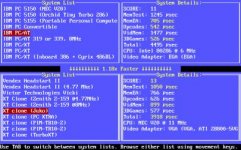musicforlife
Experienced Member
I have got this very fancy full set of Hyundai Super-16T EGA setup with HCM-1420 EGA monitor including all the manuals, drivers and utilities.
The computer contains 8088-II processor which you can manually set between 4.77Mhz and 8Mhz. The computer itself was made to be PC/XT compatible.
However when I wanted to replace my other 8Mhz machine with similar specs, I found out that all the games I am playing in my 286 8mhz machine are slower and lagging in Hyundai although the processor speed and the amount of free conventional memory is the same in both. Also both contains modern EGA card with 256kb memory and I tested it with same dos version.
Why is that? What makes this difference? I know the 286 computer is AT vs. XT but the games are working. Would it make any difference to replace 8Mhz with 10Mhz as I don't use the 4.77Mhz option but is that possible when considering the computer was made for the speed switch? Would it cause compability issues?
Here's a brochure of the machine http://www.1000bit.it/ad/bro/hyundai/Hyundai-Computer&Peripherals.pdf My unit contains one floppy drive and 20Mb hard drive.
Fun fact; while the computer is PC/XT, the keyboard layout is identical to IBM AT keyboard even with all the leds while XT keyboards didn't contain leds.
The computer contains 8088-II processor which you can manually set between 4.77Mhz and 8Mhz. The computer itself was made to be PC/XT compatible.
However when I wanted to replace my other 8Mhz machine with similar specs, I found out that all the games I am playing in my 286 8mhz machine are slower and lagging in Hyundai although the processor speed and the amount of free conventional memory is the same in both. Also both contains modern EGA card with 256kb memory and I tested it with same dos version.
Why is that? What makes this difference? I know the 286 computer is AT vs. XT but the games are working. Would it make any difference to replace 8Mhz with 10Mhz as I don't use the 4.77Mhz option but is that possible when considering the computer was made for the speed switch? Would it cause compability issues?
Here's a brochure of the machine http://www.1000bit.it/ad/bro/hyundai/Hyundai-Computer&Peripherals.pdf My unit contains one floppy drive and 20Mb hard drive.
Fun fact; while the computer is PC/XT, the keyboard layout is identical to IBM AT keyboard even with all the leds while XT keyboards didn't contain leds.
Last edited:

